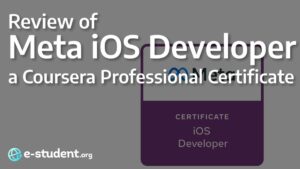FutureLearn’s ExpertTracks, first launched at the beginning of 2021, are modern learning programs that perfectly symbolize the skills economy we now find ourselves in.
In this economy, knowledge and skills are not stagnant but rather fluid. To ensure future viability in this economy, one has to continuously learn new knowledge or expertise.
This is why modern learning programs like ExpertTracks focus on teaching very particular sets of skills required to succeed in the workforce, rather than going the route of lengthy traditional degrees that try to cover a little bit of everything.
Why is that beneficial?
For one, modern employers often don’t demand degrees from job applicants anymore. Rather, they will ask for evidence of working experience, portfolios, or expertise in specific fields.
Secondly, these types of programs are often more affordable and accessible for learners, especially if their future employability potential is uncertain. A future of self-employment looms on the horizon as automation threatens to replace workers in many industries. Online programs can help you acquire in-demand skills dozens of times quicker to give you an edge.
Thirdly, job market trends show us that in the near future, the skills needed to succeed in the workforce will be dynamic and changing. The future of work is about continuous, lifelong apprenticing rather than a one-time degree at university.
Finally, it’s worth highlighting another tremendous advantage online programs have over traditional face-to-face learning: self-paced learning. With ExpertTracks, you can study at the time, place, and speed that suits you best. Until you experience the power of self-paced learning first-hand, it’s easy to miss its power.
For these reasons and more, sooner or later, you’ll want to start taking programs such as ExpertTracks. Otherwise, you’ll risk being left in the dust while others steer ahead of you by acquiring skills quicker and more efficiently than you.
However, how do ExpertTracks rank up against the alternatives? Let’s take a closer look and find out.
Here’s what we’ll cover in this review of ExpertTracks:
Table of Contents
What is an ExpertTrack?
ExpertTracks are self-paced online course series offered on the UK-based online learning platform FutureLearn. An ExpertTrack consists of multiple courses and within a single ExpertTrack, all the courses target a particular subject designed to help students learn new sets of skills in specialist areas that are in demand in the workforce.
To enroll in ExpertTracks, students have to pay a monthly subscription fee which includes access to all courses within the program, together with all quizzes, assessments, and certificates of completion.
To develop ExpertTracks, FutureLearn works with universities, industry partners, and governments around the world to help ensure that all the programs are designed by experts in their respective fields.
This type of cooperation with stakeholders ensures a higher course quality, and this often sets FutureLearn’s programs apart from other traditional MOOCs such as Udemy’s, which tend to be rather hit-or-miss in terms of content quality. The latter types of e-learning platforms tend to have inferior instructor vetting processes and this leads to a lower overall quality of education. In the case of ExpertTracks, though, you’re getting your education straight from respected sources such as universities and corporations.
Now, let’s go over a point I see discussed often: are ExpertTracks really a substitute for degrees? The answer can be both a “yes” and a “no” depending on your needs, but let’s go over the major differences between the two.
ExpertTracks vs degrees: what's the difference?
Needless to say, degrees will likely not become fully obsolete for decades to come. We’re creatures of habit and the idea of not going to college is still a shocking thought for many parents and students. But, in this day and age when university degrees don’t guarantee employment after graduation, it’s worth considering that something like an ExpertTrack might be more valuable on the labor market today.
Let’s say you want to learn about cybersecurity.
If you go the route of a traditional degree, your learning pathway will usually look something like this:
- Get a computer science bachelor’s degree (3-4 years)
- Get a cybersecurity master’s degree (2 years)
Thus, to develop job-ready skills in cybersecurity, at a bare minimum, you’ll have to spend around 5-6 years studying at school. All the while having to take college courses in subjects you may not be interested in and having to pay exorbitant amounts of tuition money if you’re a paying student.
Alternatively, you can just spend a few months studying cybersecurity with FutureLearn’s ExpertTrack “Cyber Security Foundations“, finish the course, and get your certificates of completion for future employers to see. You can spend the rest of those years of saved time and money on building a portfolio and getting real-world experience.
Microcredentials in general – and FutureLearn’s ExpertTracks in particular – flip the traditional degree-based learning model on its head, by allowing students to choose very specific competencies to add to their skillset.
Nowadays, not every talented programmer has a bachelor’s degree in computer science, and not everyone has the time to get one. These people might be just as experienced as programmers, but their lack of a bachelor’s degree limits them from getting a high-level education in cybersecurity.
ExpertTracks, however, don’t require or give out any degrees – only skills. Elon Musk, in a 2014 interview with Auto Bild, said it best: “skills matter more than degrees“. In the skills economy, degrees are losing their once vital role, and that is why the value of programs such as FutureLearn’s ExpertTracks is likely to grow with time.
What does an ExpertTrack subscription include?
When you subscribe to an ExpertTrack on FutureLearn, you get access to:
- All the individual online classes within that ExpertTrack.
- Any quizzes or assessments that are part of the courses.
- A digital certificate of completion after you graduate.
These features may seem basic, but keep in mind that many MOOC platforms will demand separate payments for each of these. That is why the deal becomes very appealing to experienced online students who know how easily the costs of getting microcredentials can start adding up.
How much do FutureLearn's ExpertTracks cost?
The cost of purchasing a subscription to a FutureLearn ExpertTrack is the same across all ExpertTracks. ExpertTrack students are billed monthly and the monthly cost is:
- $39 for United States students
- £36 for United Kingdom students
- €36 for European students
- AUD $59 for Australian students
Considering that the average ExpertTrack takes around 3 months to complete, the price is very fair. At least when compared to the alternatives out there. To bring this point closer to home, let’s compare the pricing of FutureLearn’s ExpertTracks with a few of their competitors.
Pricing of ExpertTracks vs. the alternatives
In this section, we’ll compare ExpertTracks to the following three online alternatives:
- Udacity
- edX’s XSeries
- Coursera’s Specializations
Let’s start off with Udacity.
While they serve a different target audience, let’s compare ExpertTracks with Udacity’s trademarked online course series: Nanodegrees. Udacity’s Nanodegrees usually cost $399 per month, while ExpertTracks cost $39.
Thus, Udacity’s programs cost a whopping 1000% more than ExpertTracks.
Or, perhaps a more accurate platform of comparison is edX: a non-profit platform known for its affordability.
They offer microcredential programs called the “XSeries” that are similar to FutureLearn’s ExpertTracks. The prices of XSeries vary depending on the topic, but as an example let’s use the “XSeries Program in CS50’s AP® Computer Science Principles”. This program takes 5 months to complete and costs $398.
This brings the monthly cost of the XSeries program to $79: around 200% more than ExpertTracks. Still cheap, but about two times more expensive than ExpertTracks.
As a final comparison, let’s use Coursera’s Specializations. Just like ExpertTracks, these are a series of courses compiled around a specific set of skills aimed at beginners. Similar to XSeries, these programs vary in their price range, but most commonly they are priced around $47 to $76 per month.
And, once again, FutureLearn’s ExpertTracks come out on top, giving students a discount of 20% to 95%. As it appears, ExpertTracks are currently the most cost-effective online learning series out there.
Conclusion: are ExpertTracks worth it or not?
Yes, from what we have seen, ExpertTracks are absolutely worth the spend. These programs offer excellent “bang for the buck” compared to other online learning platforms, and combined with the high instruction quality and well-vetted partners, this results in very cost-effective programs.
ExpertTrack programs provide a great solution for people who want to learn new skills but don’t have time or money for full-sized degrees. They’ll help you close the skills gap and reap the rewards.
After reviewing the pricing of FutureLearn’s ExpertTracks and comparing it against the alternatives on the market, we found that ExpertTrack programs were the cheapest, most affordable programs of their kind on the market.
Currently, FutureLearn’s selection of microcredential programs is not as expansive as a few of its competitors, but FutureLearn is expanding its ExpertTrack portfolio on a monthly basis. Thus, it’s worth keeping an eye on the course catalog if you’re looking for a specific topic that ExpertTracks don’t cover yet.
For all these reasons, it’s safe to say that FutureLearn’s ExpertTracks are absolutely worth your time and money. In fact, they offer the very best price-to-quality ratio on the MOOC market. Thus, we give these programs a strong recommendation.



